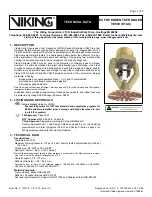
User manual PS 6379 / Issue 1 © 2006 ASL Intercom, Utrecht, The Netherlands
16
10.0 CABLING
For the PRO Series Intercom system the
interconnecting cables are of the shielded two-
conductor microphone cable type and the intercom line
connectors are of the XLR-3 type. Audio and Call
signals are on XLR pin 3, DC power is on XLR pin 2.
XLR pin 1 is connected to the shield of the cable which
functions as the common return for audio and power.
Since the audio signal is transferred in an
unbalanced
way, certain rules have to be obeyed when installing
the cables of an intercom network. This is to avoid
earth loops and to minimize power loss and the
possible effect of electromagnetic fields.
These rules are:
• Use high quality (multipair) cable.
For interconnecting user stations, power supplies
and accessories in an ASL Intercom network, use
high quality shielded two-conductor (minimum 2x
0.30 mm2) microphone cable only.
In case of a multi channel intercom network, use high
quality microphone 'multipair' cable only, each pair
consisting of two conductors (minimum 2x 0.15 mm2)
with separate shield. Multipair cable should also have
an overall shield.
• Use flexible cables.
Use flexible single and multipair microphone cable
instead of cable with solid cores, especially when the
cable is subjected to bending during operation or
installation.
• Separate cable screen to XLR pin 1.
The screen of each separate microphone cable
and/or the screen of each single pair in a multipair
cable, should be connected to pin 1 of each XLR-3
connector. Do not connect this cable screen to the
metal housing of the connector or to metal wall boxes
(outlets).
See page 10 for Earthing Concept.
• Cable trunks, connection boxes and overall
multipair cable screen to clean earth.
Metal cable trunks, metal connection boxes and
overall multipair cable screen should be inter-
connected and, at one point (the 'central earthing
point') in the intercom network only, be connected to
a clean earth or a safety earth.
See page 10 for Earthing Concept.
• Keep metal connection boxes and cable trunks
isolated from other metal parts.
Metal housings for intercom cables and connectors
should be mounted in such a way that they are
isolated from other metal cable and connector
housings and from any other metal construction
parts.
See Party Line, Technical Concept
• Keep cables parallel as much as possible.
When two (multi channel) units in a network are
connected by more than one cable, make sure
that these cables are parallel to each other over
the whole distance between those units. When
using multipair cable, parallelism is ensured in
the best possible way.
• Avoid closed loops.
Always avoid that cables are making a loop. So-
called 'ring intercom' should not physically be cabled
as a ring. All cable routes should have a 'star'
configuration, with the central earthing point (usually
close to the power supply position) as the centre of
the star.
• Keep cables away from electromagnetic sources.
Keep intercom cables away from high energy cables,
e.g. 110/220/380V mains power or dimmer controlled
feeds for spotlights.
Intercom cables should cross energy cables at an
angle of 90
°
only.
Intercom cables should never be in the same
trunking as energy cables.
• Place power supply in a central position.
In order to avoid unacceptable power losses, place
the power supply as close as possible to where
most power consumption occurs or, in other words,
most user stations are placed.
• Connect ASL power supply to a 'clean' mains
outlet.
The ASL power supply may be connected to the
mains power outlet to which other audio equipment
is connected. Avoid using mains outlets which also
power dimmer controlled lighting systems.
In case of more complex installations, don't hesitate to
contact us. Please sent us a block diagram of the
planned network with a list of all user stations and their
positions, and we are happy to advise you on cabling
lay out.





































